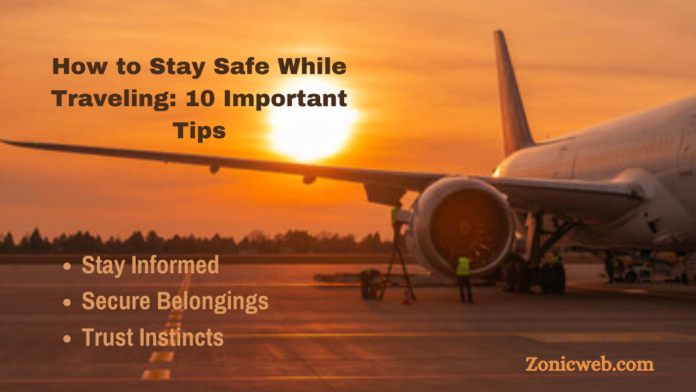Remaining protected while venturing out is urgent to guaranteeing that your excursion is charming and liberated from pressure. Here are ten crucial tips to keep you safe while traveling:
Before you leave, first thoroughly research your destination. This includes knowing what the locals do, where to stay away from, and what might go wrong. You can stay alert and informed by reading up on safety issues specific to your destination, such as common scams and unsafe neighborhoods.
Second, you should always tell someone you trust back home about your itinerary. If you tell a friend or family member about your travel plans, they will know where you are in case of an emergency. Always check in with them, especially if you’re moving around.
Thirdly, keep duplicates of crucial documents. Copies of your identification, travel insurance, and passport ought to be stored separately from the originals. Along these lines, assuming something gets lost or taken, you can undoubtedly get to the duplicates for speedy substitutions or confirmation.
Fourth, handle your money with care. Avoid carrying a lot of cash and keep it in multiple places, such as a wallet, money belt, and hotel safe. Additionally, it is essential to inform your bank of your travel plans to avoid having your account flagged for suspicious activity, which could result in blocked cards.
Fifth, try to blend in as much as possible with the locals. Dress modestly and in accordance with the local customs to avoid appearing out of place as a tourist. To avoid attracting unwanted attention, conceal expensive jewelry, maps, and cameras.
Sixth, don’t go out on a nighttime solo walk, especially in unfamiliar places. Choose streets that are well-lit and populated if you must travel at night. Instead of walking through dangerous or deserted areas, choose dependable transportation options like licensed taxis or rideshares.
Seventh, always pay attention to your surroundings. Pickpockets love to target crowded places like markets, tourist attractions, and public transportation. Keep your assets close, and be careful about interruptions that may be endeavors to take from you.
Eighth, make certain that your lodging is safe. Always lock your doors and windows, and stay in reputable hotels or hostels. To safeguard your valuables, make use of any security features the lodging facility provides, such as safes or electronic key cards.
Ninth, keep in touch with people you meet who are locals or tourists. You can make better decisions during your trip by sharing information about safety issues, areas to avoid, or positive travel experiences. Don’t be afraid to ask hotel staff or tour guides for local safety advice.
Lastly, go with your gut. Get out of a situation as soon as you can if it makes you feel unsafe or uncomfortable. Your intuition is frequently the most effective safety guide, whether you’re dealing with a questionable taxi ride, an unfamiliar individual, or a location that doesn’t seem right.
You can enjoy your trip with peace of mind and reduce the risks associated with traveling by following these recommendations. When traveling to new places, safety should always come first.
Frequently asked questions (FAQ)
1. How can I protect my valuables while traveling?
Ans: Keep your valuables in multiple secure locations, such as a money belt, wallet, and hotel safe. Avoid carrying large amounts of cash, and leave expensive jewelry at home. When out, stay aware of your surroundings and use anti-theft bags or pouches to deter pickpockets.
2. What should I do if I lose important documents while traveling?
Ans: Make copies of your important documents like your passport, travel insurance, and identification before leaving home. Store the copies separately from the originals, and also keep digital versions. If you lose your passport, contact your country’s embassy or consulate immediately for assistance in getting a replacement.
3. How can I stay safe when traveling alone at night?
Ans: Avoid walking alone at night, especially in unfamiliar or deserted areas. Stick to well-lit, populated streets, and use reliable transportation options like rideshare apps or licensed taxis. If possible, let someone know your plans and expected time of arrival.
4. How can I prevent falling victim to common travel scams?
Ans: Research common scams in your destination beforehand. Stay vigilant in tourist-heavy areas, avoid unsolicited offers from strangers, and be cautious with anyone who seems overly friendly or pushy. If something feels off, trust your instincts and walk away.
5. What should I do if I feel unsafe while traveling?
Ans: Trust your instincts and remove yourself from any situation that feels uncomfortable or dangerous. Whether it’s a location, person, or activity, don’t hesitate to leave. If necessary, seek help from local authorities, hotel staff, or fellow travelers.
